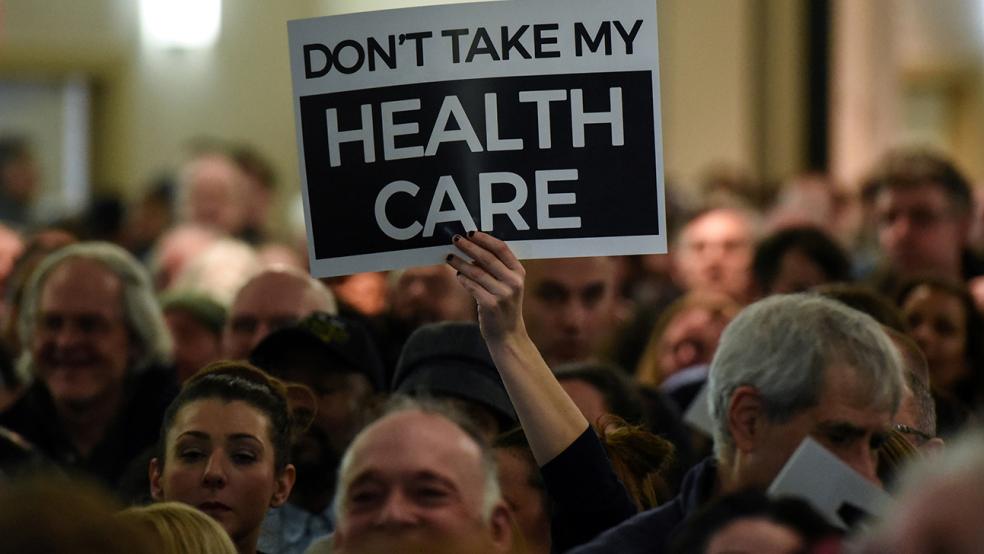With the political climate thoroughly poisoned by the election, and Trump, Ryan and Senate Majority Leader Mitch McConnell (R-KY) holding the whip hand in dictating the direction Congress will go, the prospects of any meaningful compromise on health care seems far-fetched. Yet even if the Republicans succeed in ramming through a budget resolution later this month or in early February to repeal Obamacare at some future date, Republicans will need eight or more Senate Democrats to adopt a replacement plan under Senate rules.
One idea that is gaining some attention is the Solomon-like proposal of freshman Sen. Bill Cassidy (R-LA) to create an unusual hybrid approach. Cassidy’s approach would essentially shift major decision-making authority away from the federal government and allow the states to decide whether to stick with some version of Obamacare or opt for whatever Trump and the Republicans come up with.
Related: Congress Is Headed for a Showdown With Trump Over Obamacare Repeal
Cassidy, one of a half-dozen moderate Senate Republicans who has voiced concern about their party’s increasingly perilous course on health care, first introduced “The World’s Greatest Healthcare Plan” bill a year ago in concert with Rep. Pete Sessions (R-TX). It began as a bid to give patients “market-based solutions” by lowering costs, eviscerating Obamacare mandates on individuals and businesses, and returning power over insurance to the states.
But over time, the Cassidy-Sessions approach has evolved into a potential starting point for the two parties to negotiate a compromise that would somehow preserve many of the features strongly favored by Democrats and blue states while allowing the Republican majority and its allies among red states to chart a new course in national health care.
“I believe that Republicans and Democrats can find common ground,” Cassidy said in a floor speech earlier this month. “My replacement plan would give states the option.”
“I am willing to concede that some folks—the Minority Leader—believe that Obamacare is working just fine,” he said. “In my plan, we repeal Obamacare on a federal level, but if states like California or New York think that Obamacare works for them, then god bless them.”
Related: Rand Paul’s Obamacare Substitute: Take Two Aspirin and Call Me in the Morning
Under Cassidy’s approach, state legislatures in Sacramento, Albany and the rest of the country could decide to take federal funding to maintain an Obamacare-style system in their own states or opt for the GOP alternative.
The legislation would repeal the federal mandates that require individuals to purchase health insurance and that require employers to provide coverage under the threat of penalties. Every American would receive a refundable tax credit that could be spent on health insurance premiums or deposited into a Health Savings Account and used to pay directly for health care services. They would also qualify for catastrophic major medical coverage and prescription drugs.
“Under my replacement plan, we would also cover more Americans than Obamacare by giving states the option of enrolling the uninsured in a basic health plan unless they choose to opt out,” Cassidy explained. “This will likely lead to 95 percent enrollment or more.”
The plan calls for a two-year transition period that would give states through 2018 to decide what approach to take. By 2019, the GOP repeal and replace plan would take effect, although states that chose to stick with Obamacare could subsequently opt out.
Related: Obamacare Repeal Could Push Rural Hospitals to the Brink
Joseph Antos, a health care expert with the conservative-leaning American Enterprise Institute, said on Tuesday that the Cassidy-Sessions approach might offer the seeds of a compromise.
“It’s a hybrid approach, and like all hybrid approaches it could be the basis for conversation,” he said. “I think that there would be substantial changes to it, but it does point in a useful direction for Republicans.
“You have to recognize that many aspects of the ACA have changed the individual insurance market in a fundamental way, and some of those things you’re just not going to be rolling back.”
Ezra Klein, writing today in Vox, recalled that in 2006, Price and Tammy Baldwin, then a liberal Democratic House member and now a senator from Wisconsin, co-sponsored a bill to allow states to make more creative use of federal funds in providing health care to their residents.
Related: The Potential Cost of Obamacare Repeal: 32 Million Without Insurance
The bill asked that states submit health reform plans that would likely lead to “increased health coverage and access.” If a special bipartisan commission approved of a state’s proposed new approach to health care coverage, it would be submitted to Congress for final approval.
The Price-Baldwin bill, which drew a strong endorsement from the conservative Heritage Foundation, would provide states with a combination of repurposed existing federal money and new federal grants.
“Here, then, is what the Trump Administration could do to replace Obamacare with something better without falling flat on their face,” Klein wrote in praising an approach similar in some ways to Cassidy’s bill. “Tell the states to do it, instead.”





